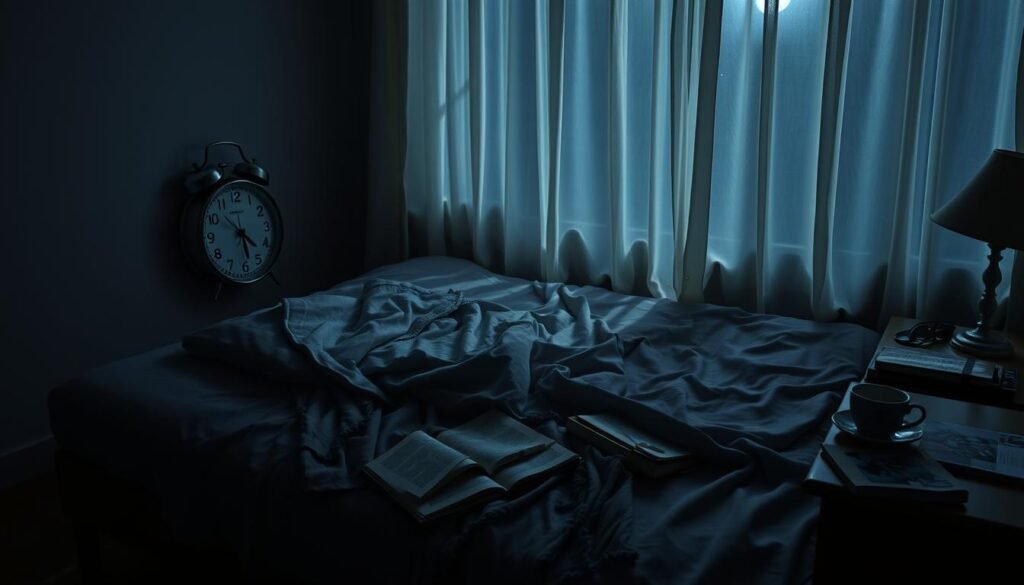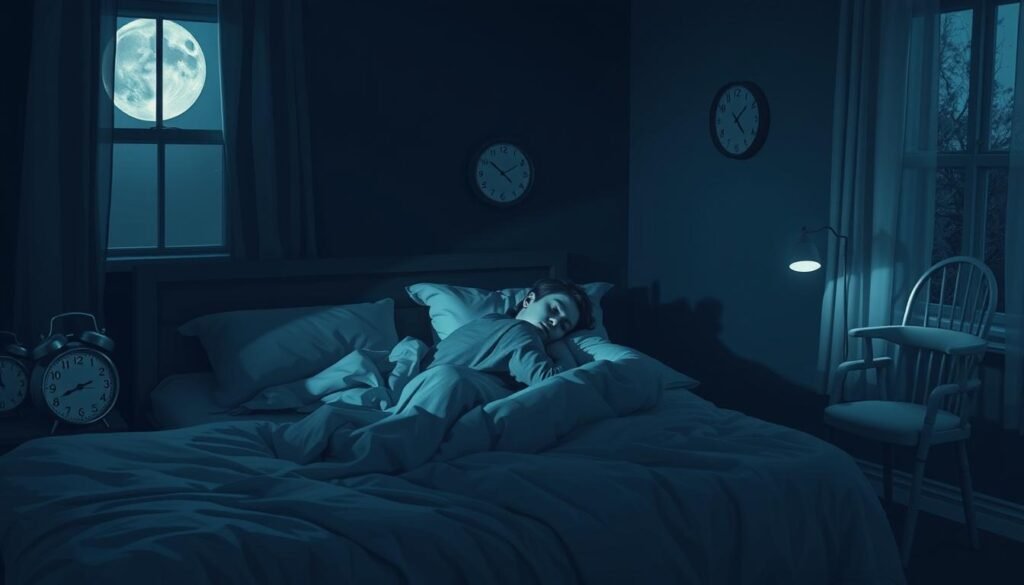Have you ever thought about how grief affects your sleep? Grief can make sleeping hard, leaving us to wonder how long it lasts. It’s not just a short-term problem. Grief insomnia can stick around and harm our health. Knowing how long it lasts and how to deal with it helps us get our sleep back.
Key Takeaways
- Grief insomnia usually comes from deep sadness and can cause long-term sleep problems.
- Chronic insomnia is when you can’t sleep well for at least three months, happening most nights each week.
- Not sleeping enough can make you more stressed and cause more inflammation.
- Prolonged grief disorder is real and can mess up your daily life, sometimes longer than you’d think.
- It’s vital to find ways to cope and have good support to handle grief insomnia.
- Understanding how important sleep is can help us get through grief and improve our health.
- Therapy and changing some habits can lessen grief’s impact on how well we sleep.
Understanding Grief and Its Impact on Sleep
Grief deeply affects life, especially sleep. Knowing the grief stages helps us understand our feelings when we lose someone. These stages include disbelief, bargaining, anger, depression, and acceptance. Each person goes through these stages in their own way. This can lead to different feelings that disturb sleep.
Defining Grief and Its Stages
The grief stages help us grasp the complex emotions after losing someone. Each stage’s length and intensity can vary from person to person. These emotional ups and downs not only hurt our mental health but also our sleep quality.
The Relationship Between Grief and Sleep Patterns
Studies show that grief and sleep problems are linked. Bad sleep during grief can worsen the emotional pain. This makes it harder to get over the loss. People often get too much light sleep and not enough deep sleep. Deep sleep is for physical healing. REM sleep helps with processing emotions. This comes later in the night. Grieving people might find it hard to stay asleep. This hurts their overall health.
https://www.youtube.com/watch?v=7_jLOVWqrkM
To improve sleep, avoid alcohol before bed and caffeine after 3 PM. Try relaxation methods and make your sleeping area cozy. These steps can help you sleep better while dealing with grief.
What Is Grief Insomnia?
Grief insomnia is when you find it hard to sleep after losing someone close. It’s caused by the deep sadness of loss. Knowing about grief insomnia helps us understand its effects on health.
How Grief Insomnia Differs from Other Types of Insomnia
This sleep issue is unique because it’s tied to the pain of losing someone. Other insomnias might come from stress or anxiety. But grief insomnia comes from the heartache of loss. It leads to trouble sleeping, waking up a lot, and lying awake.
This makes it crucial to know it’s not just any sleep problem.
Common Symptoms of Grief Insomnia
Knowing how grief insomnia shows up is key in getting the right help. The main signs are:
- Difficulty falling asleep because you can’t stop thinking about the person.
- Frequent nighttime awakenings, which bring worry and distraction.
- Middle insomnia, finding it hard to sleep again after waking up.
- Extended periods of wakefulness, which hurt the quality of your sleep.
These signs can make everyday life harder, showing why we need to deal with grief insomnia quickly.

How Long Does Grief Insomnia Last?
Grieving affects people differently, changing how they feel and sleep. Many face grief insomnia, which disturbs normal sleep. Knowing how long bereavement insomnia lasts can help during these hard times.
Typical Duration of Insomnia After Loss
Mostly, grief insomnia is worst in the first six months after losing someone. People tend to have more sleep issues then. Though some start to sleep better with time, many have ongoing problems. About 80% with prolonged grief disorder suffer from long sleep troubles. So, how long does grief-related insomnia last? It really depends on the individual since grief has no set timeline.
Factors That Influence the Duration of Grief Insomnia
Many things affect how long and severely one suffers from grief insomnia. Important factors are:
- The relationship with the person who passed away
- How a person copes and their resilience
- Any previous mental health issues like anxiety or depression
- Having people around who offer support
For example, those very close to the deceased often feel sadder, making their insomnia last longer. Pre-existing mental problems can make coping harder. Knowing these factors helps tackle the effects of insomnia right.

Since grief affects everyone differently, help for insomnia should be personal. Support and good sleep habits are key for those going through this hard time.
Coping with Grief-Related Insomnia
Grieving can mix up all sorts of emotions, making it hard to sleep well. It’s key to know how grief links to insomnia. This knowledge helps in spotting complicated grief, which affects both mind and body. We will look into the signs of this grief and share tips to sleep better during these tough times.
Recognizing the Signs of Complicated Grief
Sometimes, grief lasts long and hits hard, messing up everyday life. Signs to watch for include ongoing shock, anger, and feeling alone, all of which can spoil sleep. You might feel more anxious or have thoughts that just won’t leave. Knowing these signs is the first step to getting the right help and coping tools.
Strategies for Better Sleep During Grief
There are smart ways to fight grief-related sleep problems. Follow these steps:
- Maintaining a consistent sleep schedule: Fixed sleeping and waking times tune your body’s clock.
- Engaging in regular exercise: Activity lessens stress and helps you relax, leading to better sleep.
- Practicing relaxation techniques: Techniques like mindfulness and deep breathing before bed can calm the mind.
- Limiting caffeine and alcohol: Cutting down on these can improve how well you sleep.
- Avoiding blue light: Staying away from screens before bed lets your body get ready for sleep.
- Seeking support: Talking to support groups or professionals provides comfort and aids healing.
Following these tips can lessen insomnia’s impact. With the right sleep strategies, handling grief and its challenges becomes easier. For more on how sleep troubles can make grieving harder, check out this article.

Managing Sleep Issues During Mourning
When you’re grieving, it’s common to have trouble sleeping. Finding ways to manage sleep problems during mourning is key to healing. Working on the sleep environment and a steady routine helps improve sleep despite emotional pain.
Creating a Sleep-Inducing Environment
A better sleep environment is crucial for good rest. Here are important factors:
- Lighting: Use blackout curtains to make your room dark.
- Sound: Reduce noise with earplugs or white noise machines.
- Comfort: Choose a supportive mattress and comfy pillows.
Creating a calm space is essential, especially when you’re sad. A peaceful room improves sleep even with stress.
The Role of Routine in Improving Sleep Quality
Keeping a stable sleep schedule helps a lot. Try these tips:
- Regular Schedule: Go to bed and wake up at the same time daily. It helps your body’s sleep cycle.
- Mindfulness Activities: Relax with yoga or meditation before bed.
- Avoiding Naps: Don’t nap late in the day to sleep better at night.
Sticking to a routine can lift your mood while grieving. Adding these steps can ease sleep struggles during hard times.
Grief’s Impact on Sleep Patterns
Grief deeply changes how we sleep. While dealing with loss, our sleep quality and feelings are closely linked. Studies show that people who are grieving often struggle more with sleeping well. This starts a tough cycle of stress and tiredness.
How Emotional State Affects Sleep Quality
Grief brings up strong feelings like sadness, anger, and worry. These emotions can mess up our sleep patterns. Research finds that those who have lost a loved one are much more likely to have sleep problems. This is compared to those who aren’t grieving. High levels of stress hormone cortisol are also seen in those who grieve. This can make sleeping well even harder. Emotional pain makes it hard to sleep without waking up. It often makes people turn to sleep meds for help.
The Connection Between Physical Health and Sleep During Grief
Our bodies and our grief are connected. Emotional hurt can show up as physical issues. People grieving might get inflammation. This affects their health and sleep. Grief can also increase the risk of heart problems in some. Knowing how grief affects sleep and health is important. If not dealt with, it could lead to more health issues. For more on sleep troubles and grief, check out these key insights on insomnia and ways to cope.
Overcoming Grief and Insomnia
Addressing grief and insomnia is important. We need to understand the various ways to help and the support needed in recovery. People dealing with grief-related insomnia can get better with the right help. This might include ways to improve sleep while handling their sadness.
Therapeutic Approaches to Address Grief Insomnia
Many ways can help with grief insomnia. This includes cognitive-behavioral therapy (CBT), counseling, and joining support groups. CBT helps change bad thought patterns and actions that make it hard to sleep. Counseling offers a place to talk about your grief. Support groups let people share stories and connect with others facing similar issues.
By trying these methods, you can sleep better and feel stronger emotionally. This is key to getting through grief and insomnia.
Support Systems and Their Importance in Recovery
Having support is very important for those dealing with grief and insomnia. Loved ones and professional counselors offer comfort and advice during tough times. Getting involved in community activities, like support groups or grief counseling, helps a lot too. These groups give a chance to learn from others and find coping ways.
By seeking out support, you can deal with grief better and start to sleep well again.
Grief Insomnia Recovery Timeline
Understanding the grief insomnia recovery timeline is essential. It helps manage expectations and recognize the path to better sleep. Grief is a deeply personal experience and varies greatly among individuals. So, knowing what to expect can greatly help one’s healing journey.
Setting Realistic Expectations for Recovery
Recovery from grief-related insomnia is usually gradual. It can take months or even years. While some may find quick relief, others take longer to overcome emotional and physical symptoms. Having a realistic view of this timeline helps accept ongoing grief, even as it gets easier to handle. Emotional ties can deepen sorrow, needing patience and self-compassion in recovery.
Indicators of Progress Towards Better Sleep
Noticing signs of progress is reassuring on this journey. Signs of improvement may include:
- Improved sleep quality, like falling asleep faster and staying asleep.
- Less intense grief symptoms, such as sadness or anxiety.
- A better ability to do daily tasks without being overwhelmed by sadness.
- Less grief-related tiredness and clearer thinking.
Although recovery timelines vary, these signs of progress are hopeful. Acknowledging these small steps can motivate one to keep up with coping strategies. It might even lead to seeking further help. For more insight on dealing with grief, visit this resource.
Conclusion
The journey through grief deeply affects our sleep. This summary of insights on grief and sleep shows how grief-induced insomnia messes with our rest. It also hints at deeper emotional issues. By understanding what causes it and how long it might last, people can find better ways to cope and get the support they need.
It’s important to see how grief and lack of sleep are linked. Solving sleep problems can improve our overall health and help us recover from loss. Research shows that over 50 million people worldwide have sleep disorders. This highlights the need for good sleep health, particularly for those who are grieving. For them, getting help from professionals and trying therapy might make a big difference. This is because there’s a known link between feeling emotionally upset and having trouble sleeping.
Dealing with these issues quickly and effectively can really help improve our health. If you’re struggling with sleep because of grief, there’s good info and resources out there. Here is a place where you can learn more about how grief affects sleep. With the right help and strategies, turning grief into a chance for healing is possible.